Abstract
Drug camps have been used to treat substance use in Thailand since the 2000s. However, some researchers have argued that drug camp’s effectiveness was insufficient to help the attendants to be abstinent. This study explored the drug camp’s effects by comparing a drug camp model, developed based on 12-Step, cognitive–behavioral theory, and group psychotherapy theory with one that currently has been used in drug camps in Thailand. One drug camp in Nakhon Ratchasima was selected as an area of study. Drug attendants who lived in Khong district were assigned into a 12-Step group, which used the new model (n = 35). Meanwhile, other attendants who lived in other districts in Nakhon Ratchasima were assigned into a treatment-as-usual group (n = 57). Methamphetamine use behavior was assessed before and after the camp. There was a significant difference between the 12-Step and treatment-as-usual group on the level of the attendants’ average methamphetamine use after controlling average methamphetamine use before drug camp [F (1,84) = 91.76, p < 0.001]. Comparing the estimated marginal means showed that average methamphetamine use 1 year after drug camp of the 12-Step group (mean = 0.74, SD = 1.79) was lower than the treatment-as-usual group (mean = 11.25, SD = 14.06). One year after camp, Cox proportional hazards regression indicated that the chances of the attendants in the 12-Step group returning to methamphetamine use were reduced by 88% (adjusted hazard = 0.120, 95% CI 0.061–0.023) after controlling for confounding variables, including age, marital status, education, and occupation.



Similar content being viewed by others
References
Ali, B., Green, K. M., Daughters, S. B., & Lejuez, C. W. (2017). Distress tolerance interacts with circumstances, motivation, and readiness to predict substance abuse treatment retention. Addictive Behaviors, 73, 99–104. https://doi.org/10.1016/j.addbeh.2017.04.016.
Assanangkornchai, S., Arunpongpaisal, S., & Kittirattanapaiboon, P. (2011). The alcohol, smoking and substance involvement screening test (ASSIST): Manual for use in primary care. Asia Pacific Community Mental Health Development Project. Nonthaburi Thailand: KUNATHAI Trading CO., LTD.
Ballester, J., Valentine, G., & Sofuoglu, M. (2016). Pharmacological treatments for methamphetamine addiction: Current status and future directions. Expert Review of Clinical Pharmacology, 10, 305–314. https://doi.org/10.1080/17512433.2017.1268916.
Department of Probation. (2017). National drug policy 2560. Drug Users Rehabilitation Act [in Thai]. Retrieved January 15, 2018, from https://www.oic.go.th/FILEWEB/CABINFOCENTER2/DRAWER051/GENERAL/DATA0000/00000611.PDF.
Donovan, D. M., & Wells, E. A. (2007). “Tweaking 12-Step”: The potential role of 12-step self-help group involvement in methamphetamine recovery. Addiction, 102, 120–128. https://doi.org/10.1111/j.1360-0443.2007.01773.x.
Harada, T., Tsutomi, H., Mori, R., & Wilson, D. B. (2018). Cognitive-behavioural treatment for amphetamine-type stimulants (ATS)-use disorders. Cochrane Library, 12, 1–30. https://doi.org/10.1002/14651858.CD011315.pub2.
Hatch-Maillette, M., Well, E. A., Doyle, S. R., Brigham, G. S., Daley, D., DiCenzo, J., et al. (2016). Predictors of 12-step attendance and participation for individuals with stimulant use disorders. Journal of Substance Abuse Treatment, 68, 74–82. https://doi.org/10.1016/j.jsat.2016.06.007.
Kanato, M., Aramrattana, A., Assanangkornchai, S., Perngparn, U., Charoenratana, S., & Kannika, N. (2016). Size estimation regarding substance abuse in Thailand 2559 [in Thai]. Khon Kaen: ISAN Substance Abuse Network.
Kanato, M., Choomwattana, C., Sarasiri, R., & Leyatikul, P. (2018). ASEAN Drug Monitoring Report 2017. Bangkok: ASEAN Narcotics Cooperation Center.
Kanato, M., & Leyatikul, P. (2017). Effectiveness of drug camps in treatment of substance abuse in Thailand. Journal of Community Health, 38, 1–6. https://doi.org/10.1007/s10900-017-0356-1.
Kelly, J. F., Kaminer, Y., Kahler, C. W., Hoeppner, B., Yeterian, J., Cristello, J. V., et al. (2017). A pilot randomized clinical trial testing integrated 12-step facilitation (iTSF) treatment for adolescent substance use disorder. Addiction, 112(12), 2155–2166. https://doi.org/10.1111/add.13920.
Lee, N. K., & Rawson, R. A. (2015). A systematic review of cognitive and/or behavioural therapies for methamphetamine dependence. Drug Alcohol Recovery, 27, 309–317. https://doi.org/10.1080/09595230801919494.
Messer, S. B., & Gurman, A. S. (2011). Essential psychotherapies: Theory and practice (3rd ed.). New York: The Guilford Press.
National Institute on Drug Abuse. (2018). Principles of drug addiction treatment: A research-based guide (3rd ed.). NIH Publication. Retrieved March 20, 2018, from https://www.drugabuse.gov/download/675/principles-drug-addiction-treatment-research-based-guide-third-edition.pdf?v=87ecd1341039d24b0fd616c5589c2095principles-effective-treatment.
Rawson, R. A., & McCann, M. J. (2014). The matrix model of intensive outpatient treatment project. California, LA: The Matrix Institute on Addictions.
Royal Thai Police Headquarters. (2018). Drug reports 2561 [in Thai]. Retrieved January 15, 2018, from https://nkrat.nso.go.th/index.php?option=com_content&view=category&id=88.
Sukamti, N., Keliat, B. A., & Wardani, I. Y. (2019). The influence of coping skills training and family health education on self-esteem among adolescents in substance abuse prevention. Enfermeria Clinica, 29, 532–534. https://doi.org/10.1016/j.enfcli.2019.04.081.
United Nations Office on Drugs and Crime. (2019). World Drug Report 2019. United Nations publication, Sales No. E.19.XI.8.
World Health Organization, Western Pacific Region. [WHO]. (2018). Technical Briefs on amphetamine-type stimulants (ATS). Iris: World Health Organization, Western Pacific Region.
Yalom, I. D. (2005). The theory and practice of group psychotherapy (5th ed.). New York: Basic Book.
Yang, C., Zhou, Y., Cao, Q., Xia, M., & An, J. (2019). The relationship between self-control and self-efficacy among patients with substance use disorders: Resilience and self-esteem as mediators. Frontiers in Psychiatry, 10, 1–10. https://doi.org/10.3389/fpsyt.2019.00388.
Acknowledgements
Grateful acknowledgment is made to the ISAN Academic Network, Khon Kaen University, for generous support for facilities.
Author information
Authors and Affiliations
Corresponding author
Ethics declarations
Conflict of interest
The authors declare that they have no conflict of interest.
Additional information
Publisher's Note
Springer Nature remains neutral with regard to jurisdictional claims in published maps and institutional affiliations.
Rights and permissions
About this article
Cite this article
Chinkijkarn, T., Kanato, M. The Effects of Drug Camp in Treatment of Methamphetamine Use with a New Behavioral Change Model: A Quasi-Experimental Study. J Contemp Psychother 51, 57–65 (2021). https://doi.org/10.1007/s10879-020-09471-7
Published:
Issue Date:
DOI: https://doi.org/10.1007/s10879-020-09471-7


